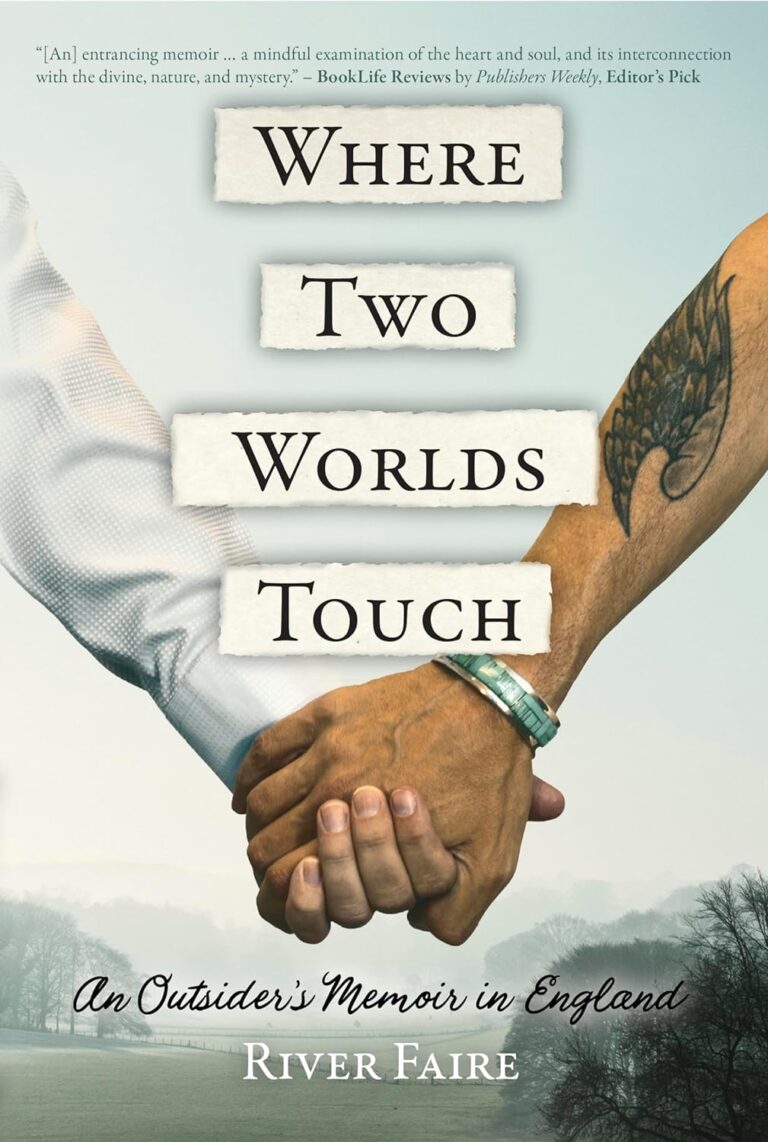Where Two Worlds Touch: An Outsider’s Memoir in England received a 4+ star review, making it an IndieReader Approved title.
Following find an interview with author River Faire.
What is the name of the book and when was it published?
Where Two Worlds Touch: An Outsider’s Memoir in England, published December 4th, 2023
What’s the book’s first line?
“I never intended to return to England.”
What’s the book about? Give us the “pitch”.
After the fairy tale of Happily Ever After ends in heartbreak, what then? A healer and Paris-trained chef returns to London from America to help his ex-partner, back from the brink of death, and finds himself on an expected journey of the heart, trusting his soul as compass for the mystery of life.
What inspired you to write the book? A particular person? An event?
While living in England, I read the various memoirs of Marlena de Blasi, internationally bestselling author of A THOUSAND DAYS IN VENICE, and A THOUSAND DAYS IN TUSCANY, an American food writer and chef who moved to Italy to marry a Venetian. I admired her lushly gilded prose, and considered her something of a kindred spirit – a tactile and sensual soul attuned to the little details which comprise the art of living. In 2015, on a trip to Paris, in a million-to-one chance encounter, I encountered Marlena at a famous Left Bank cafe (Les Deux Magots), and the beginning of a friendship was struck. Upon returning home, I decided I would pen my own story of living abroad, but in a very different vein than her books, with a more soulful and contemplative perspective.
What’s the main reason someone should really read this book?
This book is something much more than a typical memoir, in that it widens the typically narrow, self-centered focus and embraces transpersonal themes. What is it to be an outsider, and what does it mean to belong – to a place, a culture, or simply in someone’s heart? What is uniquely ours to offer the world, and how do we discover that? What is it to forgive and find healing? What does it mean to have a conscious relationship? What if everything is connected in ways we cannot begin to fathom or perceive? The rear cover of the book describes it as “a genre-defying memoir—one part love story, one part celebration of the table, one part ode to nature, and one part soul guide”; an accurate description, I think. Personally, the real shimmer of gold in this unusual story is its humanness.
When did you first decide to become an author?
I’ve written stories since childhood, and a couple of semi-autobiographical fiction manuscripts that were mostly the process of teaching myself to write. In 2009, living in England, I began writing a manuscript with the deliberate intention to publish it.
Is this the first book you’ve written?
No, it’s my fifth published one, and I’ve written a couple others not published.
What do you do for work when you’re not writing?
I’m a “radical integrity” and holistic wellness coach; I work with clients internationally through my signature 8-week coaching program.
How much time do you generally spend on your writing?
When I’m in writing mode – or editing mode, which is much of what writing is really about – I spend anywhere from two to five hours working. And I write everything by hand, including editing and corrections, with a favorite fountain pen.
What’s the best and the hardest part of being an indie?
The best thing is having total control over your work, from the editing to cover design, from typography and book layout to narration rights; and you can get the book published in a much shorter time frame, which allows you to move on to the next project. Yet unless you have experience and a very high attention to detail, you’re likely to fall short of what the Big 5 publishers create for products. Because so many indie books are lower in quality (writing, editing, production), there is a distinct bookseller bias against them (along with other factors, such as not being able to compete with publishers discounts). Also, getting the key, professional (read, paid) reviews and promotions the book needs to succeed can be very costly. Further, as an indie author, most of the more prestigious literary review magazines, book awards and prizes, automatically shut you out from even applying or being considered.
What’s a great piece of advice that you can share with fellow indie authors?
Those who succeed are not necessarily the most talented, but the ones with the most grit and perseverance.
Would you go traditional if a publisher came calling? If so, why?
It depends on the book but, possibly yes, because the thing that traditional publishers still do best is getting the book into the hands of more readers, largely through their distribution network and discounts for bookstores.
Is there something in particular that motivates you (fame? fortune?)
Everything I do is about creating goodness and beauty in the world, in whatever modest way(s) I might, and each of my books has that aim.

